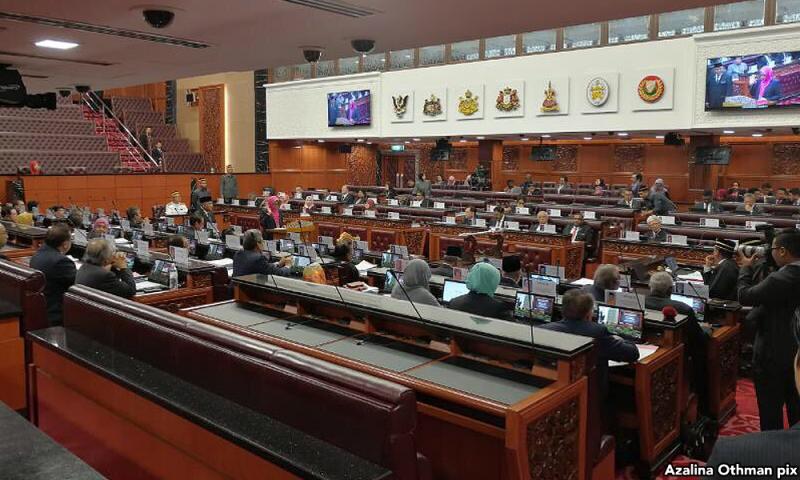Dewan Negara: Fundamentals and challenges
LETTER | The post-Merdeka Parliament is bicameral. It has the lower house or otherwise known as the Dewan Rakyat, and the upper house, the Dewan Negara or the Senate.
Prior to Merdeka, the Federation of Malay States had a legislative body, despite having a different sense to its true nature and definition, known as the Federal Legislative Council that consisted of one house only.
As provided by the Federal Constitution, the Senate consists of 70 members at any one time. Forty of the Senate members are appointed by the King as they represent specific sectoral class of society and interests which includes representing racial minorities or the aborigines, persons who have achieved distinctions in professions, commerce, industry, agriculture, cultural institutions, social services and anyone who has rendered distinguished public service.
These experienced and talented persons are appointed to the Senate without going through the electoral process. Representation of these special interests goes to the crux of the function of the Senate, which is to serve the interests of the minorities who might not be represented in the Dewan Rakyat.
The King also appoints two senators representing the Federal Territory of Kuala Lumpur, one from the Labuan and another one from Putrajaya.
The balance of 26 senators is elected by state legislative assemblies to represent the 13 states in the Federation. This provision facilitates the federal function of the Senate to have state representatives to forward the state’s individual interests and protecting their rights.
Among the reasons why the Senate is formed is to ensure parliamentary democracy can achieve its full effect despite there are flaws in the concept of democracy itself.
This is best explained when there are certain interest groups who are not represented by way of election, their interests may not be heard and considered. This issue is prevalent in a multicultural and multiracial community background in Malaysia as some sectoral groups might be left out. This is the reason why a second House is needed to ensure such minority voices can be heard.
There are several challenges for the Senate to be fully effective and functional according to its aspirations.
First, the state senators usually have their political masters, being the political party that governs the state from which they came from. This would result in the state senators speaking in accordance with their political party’s interests and affiliations, which might deviate from the interests of that particular state.
As mentioned above, it is an important federal function to have the specific state’s individual interests represented and heard in the Parliament.
Law professor Shad Saleem Faruqi opined that there should be greater coordination between state senators and the state governments for the interests of the state to be effectively heard and be given consideration.
This is further complicated when senators appointed by the King also belong to certain political parties, usually from the ruling coalition. It is manifested in reality that Senate collectively acts more in accordance to the political interests of the ruling coalition, and slightly less to the interests of those they represent.
Bills are passed through the Senate with no substantial debate, revision or review despite having such power to do so.
Second, it is the Parliament’s duty is to perform checks and balances on the actions of the executive. The Federal Constitution provides that the King, on the advice of the prime minister, appoints cabinet members from either house of the Parliament.
The appointment of ministers through the senatorship will fill the Senate with those from the executive branch that might not be able to provide effective check and balance on the government of the day in the Upper House of Parliament.
How can the Senate perform effective checks and balances on the executive if they themselves are the executive?
It should be noted, however, both in the Dewan Rakyat and the Dewan Negara, there is a provision of ‘question time’ for its members, usually the opposition, to question ministers, who they have to supply requested information, address the inquiries and justify cabinet decisions. This convention is also provided in the Senate.
Nevertheless, the issue posed in the Senate is that minister's ‘question time’ has been given in the Dewan Rakyat, hence it is seen as not prudent for them to repeat such exercise in the Senate, as ministers do not have time to attend both Houses.
The speaker of the Senate also shared this view during the launching ceremony of the Roundtable Session for the Senate Reform Committee held in Parliament on Feb 18, 2019.
Thirdly, historically, there were 22 state senators and only sixteen appointed senators. Post-1964 constitutional amendments provided for 26 state senators and a whopping 44 appointed senators.
As mentioned above, the appointed senators usually hailed from the ruling coalition. This uneven ratio is highly counter-productive to the aspirations of parliamentary democracy.
The ideals and initial intention of the Senate is to represent geographical areas and people of special interests. However, the uneven ratio results in the state senators cannot effectively forward the interests of their respective States. Constitutional expert Aziz Bari opined that this is a problem present in many Westminster nations.
There are many challenges yet which haunt the upper house of Malaysia that hinders effective exercise of its functions.
The Senate in December, with a unanimous consensus, decided for a formation of Senate Reform Committee to revise and review the position, functions of the Dewan Negara.
The committee’s objective is for a positive rebranding of the house while strengthening its functions.
It is hoped that the Senate Reform Committee will be able to take on the heavy task of ensuring the Senate to continue be relevant in this modern era of parliamentary democracy.
The views expressed here are those of the author/contributor and do not necessarily represent the views of Malaysiakini.
RM12.50 / month
- Unlimited access to award-winning journalism
- Comment and share your opinions on all our articles
- Gift interesting stories to your friends
- Tax deductable
